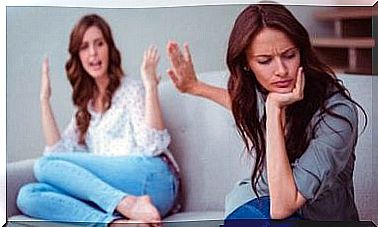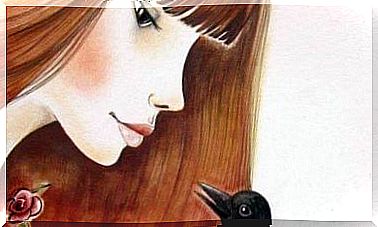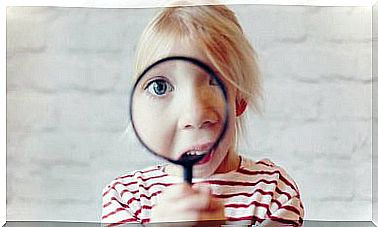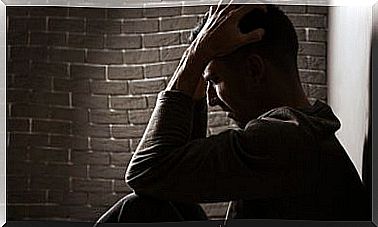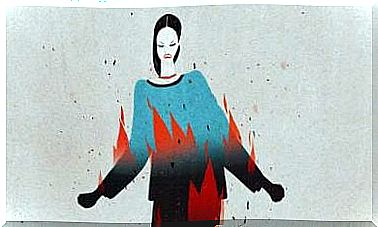4 Phrases That Heal Emotional Wounds

Emotional wounds are traces of traumatic experiences from the past that creep in and condition the present. People who decide to process and heal these injuries go through a restorative process that allows them to live more fully. But what is this path like and where does it end?
In this article, we show you four phrases that represent how some people end up reworking their own emotional wounds. Do you feel identified in any of them?
Emotional wounds of childhood
Emotional wounds are vestiges of damage, generally produced during childhood. This stage is known as the “sensitive period of development” because it is a fundamental moment in the formation of the personality. Therefore, the emotional traces produced in childhood, in part, will determine the fullness of the experience of the most adult stage.
All people have emotional wounds to a greater or lesser extent, which they deal with in the new relationships created. However, some can be so painful that they augur a present deeply anchored to this past pain.
Usually, in these cases, symptoms such as anxiety, somatizations, among others, usually arise, which finally decide the person to seek psychological help.

How do emotional wounds arise?
Emotional wounds are generally due to the experience of traumatic experiences. And, it is not only understood that serious parental negligence or situations of violence are. The traumatic criterion is given by the person who experiences it as such. That is, an emotional wound is formed when a person suffers an experience perceived as negative, which has consequences in their adult life.
The main attachment figures must provide the child with various functions, such as: emotional guidance, rapid and adequate response to needs or confidence in the child’s qualities, granting the relevant autonomy. Failing any of these issues can generate some of the so-called emotional wounds of childhood.
Some of these injuries are associated with the child’s attachment style, that is, with the child’s relationship with his parents. This relationship will mark the interpretation of the world and of the relationships that is made later. Thus, the four emotional attachment wounds are: the fear of abandonment, the fear of rejection, the wound of humiliation or ineffectiveness.
4 phrases that heal emotional wounds
Healing these injuries is a complex process. Some wounds go through their healing in psychology consultations or having other restorative life experiences. What is clear is that the elaboration of the traumatic events that have caused the emotional wounds, passes through the knowledge about them and their origin.
Here are some of the phrases that summarize the elaborative process of the four main emotional wounds.
1. “Being alone is not as bad as you thought”
This phrase has to do with the emotional wounds that refers to the fear of abandonment. This emotional injury is usually made visible by avoidance and fear at all costs of being alone in any situation. In addition, these people often create dependent relationships and remain on constant alert for the fear of being abandoned.
The person who suffers from this type of injury usually asks for help when his mechanisms not to remain alone turn against him, precisely distancing his loved ones. After an elaborative process of this emotional damage and the search for the roots in childhood, the person sometimes faces his worst fear, surprised that he is able to bear it and even enjoy it over time
2. “You deserve affection, understanding and compassion”
Emotional hurts related to fear of rejection can stem from feelings of not being accepted by loved ones. In this way, the idea is developing that oneself is not worthy of the affection or compassion of others.
People with this fear usually have a painful self-image and feel extremely insecure. However, when the childhood wound begins to heal, the person begins to establish a foundation of self-love and a vision as worthy of positive things and the affection of others.
3. “You can’t please everyone, nor do you really want to”
There are certain emotional wounds that arise from experiences related to humiliation in childhood. This unacceptable burden for a child can turn into defenses, such as self-ridicule or the constant search for approval from others.
As these children grow up, this defense often becomes a problem in itself, making it difficult to connect with their own desires and concerns. When the person manages to let go and forgive what is related to this burden, they give up constantly satisfying others and begins to show attitudes related to self-care and autonomy.
4. “You cannot control everything and that, in part, is the grace of life”
It is common for these types of emotional wounds to appear in adults whose upbringing was excessively authoritarian or emotionally cold. These children live at the mercy of an excessive and constant demand with which they struggle desperately. However, as they become adults and separate from their parents, they are likely to internalize this demand.
In this way, they become adults who anxiously try to take control of everything and who are rigid in their convictions. Generally, they come to ask for help when they break down from not being able to control certain aspects of life. Later in the elaborative process, they will be able to appreciate that the unexpected is not always negative.

Healing emotional wounds is breaking the established
Emotional wounds are damages that usually occur in childhood, in line with the relationship established with the main figures. All people have this type of injury to a greater or lesser extent. But some are painful and people decide to seek psychological support.
The origin of emotional wounds is associated with traumatic experiences, which represent a deep mark that reaches adulthood. The child, who suffers from these negative experiences, develops defenses that can become precisely a source of suffering in adulthood.
Healing emotional wounds requires going through a process, more or less complex, that involves a restorative experience. In addition, the person needs to know the emotional injury itself and its origin to begin this process. In many cases, the process of preparing them ends up understanding that, although our defense mechanisms saved us as children, today they have stopped working and harm us. It is time to reinvent yourself.

